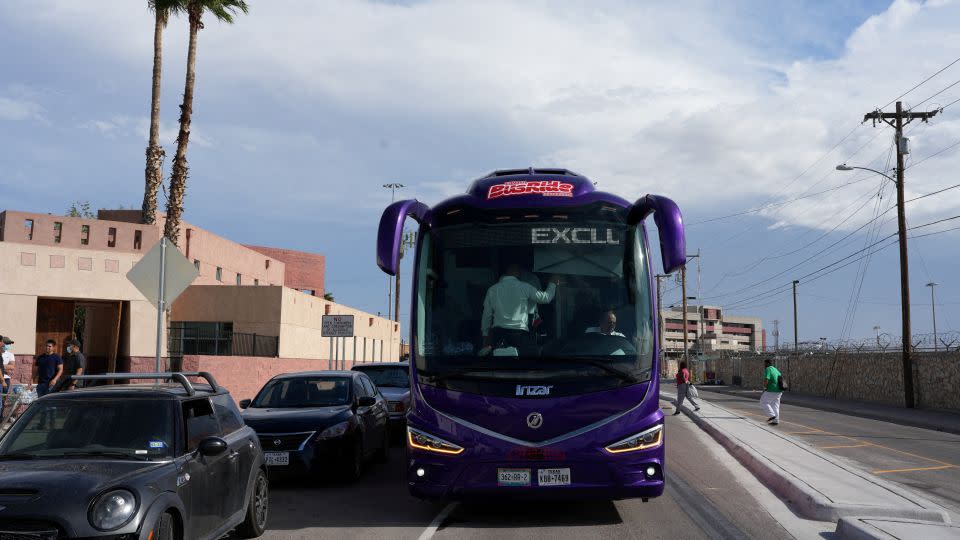What to know about Texas’ efforts to bus migrants to other states

Texas has pushed a number of efforts – from legislation to legal challenges – in its feud with federal authorities over how to tackle the migrant crisis at the US-Mexico border.
For nearly two years, the Lone Star State has also sent asylum seekers to so-called sanctuary cities across the country, such as New York City, Chicago, Washington, DC, and Denver.
Republican Gov. Greg Abbott has argued the move is to demonstrate and shift the burden that the Biden administration’s border policies continue to place on the state but the program has proved a financial burden for Texas.
CNN reported Friday that although Abbott had said the controversial migrant busing program likely wouldn’t cost taxpayers, the governor’s operation has raised less than half of 1% of the millions spent it.
Here’s what you should know about Texas’ migrant busing program:
Why is Texas sending asylum seekers to other cities?
Texas announced that it would begin sending migrants to Washington, DC, in April 2022 — a move that would eventually expand to New York City and others — in response to the Biden administration saying it would lift Title 42, a pandemic-era border rule implemented by former President Donald Trump that effectively blocked most migrants from entering the US and seeking asylum. The rule expired in May 2023, more than a year after busing began.
Abbott argued at the time of his announcement that local leaders in the state were fed up with the federal government for releasing migrants into their communities. In defending the program in 2022, Abbott said that “it was just Texas and Arizona that bore the brunt of all the chaos and problems that come with (southern border crossings).”
“Now, the rest of America can understand exactly what is going on,” he said.
What is a ‘sanctuary city’?
The definition of sanctuary city or state can vary somewhat across jurisdictions. The term is broadly applied to jurisdictions that have policies in place designed to limit cooperation with or involvement in federal immigration enforcement actions. How such policies are enforced can vary.
At least 12 states have been designated as a sanctuary, including California, Colorado, Connecticut, Illinois, Massachusetts, New Jersey, New Mexico, New York, Oregon, Utah, Vermont and Washington, according to the Center for Immigration Studies, a think tank that supports curbing immigration to the US.
Several major cities outside of those states are also so-called sanctuaries, including the ones targeted by the Abbott administration.
How many migrants have been transported?
Texas has transported more than 100,000 migrants so far, according to a news release from Abbott’s office.
The bulk of migrants were sent to New York City and Chicago, according to the release.
Who is paying for the busing?
While Abbott initially said that the busing program would likely incur “no cost to the state,” Texas taxpayers have largely footed the nearly $150 million that the state has paid to send migrants to cities across the country, according to CNN’s review of state records.
Abbott began soliciting private donations to fund the program nearly two years ago, but has only managed to raise, at most, around $550,000 to date, according to CNN’s review of records.
Read more from CNN’s Blake Ellis, Melanie Hicken, Kyung Lah and Allison Gordon here.
What are people saying about it?
Some of the cities have struggled to meet the needs of the sudden influx of asylum seekers.
Earlier this year, New York City Mayor Eric Adams filed a lawsuit against a dozen charter bus companies over transporting asylum seekers, seeking more than $700 million in damages to cover the care for those who have arrived in the city since 2022.
Chicago has issued an ordinance that bans unannounced migrant drop-offs, as a charter bus company hired by the state of Texas has filed a lawsuit against the city over the ordinance, arguing that it is unconstitutional and punishes transportation companies working with Texas.
Meanwhile, Republican lawmakers have ramped up their attacks in recent months on President Joe Biden’s broader immigration agenda as they look to make the issue a flashpoint ahead of the 2024 election.
A group of bipartisan senators reached a border compromise earlier this year, but with the urging of Trump, House Republicans have been unwilling to back the measure, which Democrats have used to defend Biden.
CNN’s Blake Ellis, Melanie Hicken, Kyung Lah, Allison Gordon, Gloria Pazmino, Alisha Ebrahimji, Amir Vera, Amy Simonson, Artemis Moshtaghian, Priscilla Alvarez and MJ Lee contributed to this report.
For more CNN news and newsletters create an account at CNN.com


